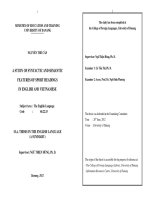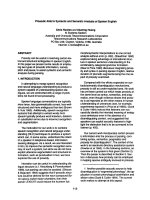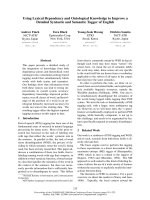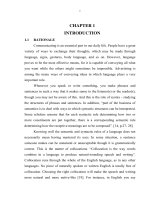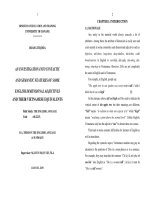Week 5 - Syntactic and semantic role of clause elements (with key) ppt
Bạn đang xem bản rút gọn của tài liệu. Xem và tải ngay bản đầy đủ của tài liệu tại đây (501.94 KB, 35 trang )
Nguyễn Hồng Diệu
HULIS VNU
Syntactic features of clause
elements
•
A SUBJECT
–
Is normally a NP or a clause with nominal function
–
Occurs before the VP in declarative clauses, and immediately
after the operator in questions
–
Has number and person concord, where applicable, with the VP
•
An OBJECTIVE (O
d
or O
i
)
–
Is a NP or clause with nominal function
–
Normally follows the S and the VP
–
Assumes the status of S by the passive transformation
–
The O
i
precedes the O
d
and is semantically equivalent to a
prepositional phrase
Syntactic features of clause
elements
•
A COMPLEMENT
–
Is a NP, and Adj phrase, or a clause with nominal function
–
Has a co-referential relation with S or O
–
Follows the S, VP, and O
–
Does NOT become S through the passive transformation
•
An ADVERBIAL
–
Is and Adv phrase, adverbial clause, NP, or prepositional phrase
–
Is generally capable of occurring in more than one position in
the clause
–
Is generally optional (may be added to or removed from a
sentence without affecting its acceptability), except for the
obligatory adverbial or the SVA and SVOA patterns
Semantic roles of clause
elements
Can you comment on the
role of the Subjects in the
following sentences?
1. John opened the door.
2. The wind opened the door.
3. The door opened.
4. John has a big house.
5. This hall can hold about eighty students.
6. Today is April Fool’s Day.
7. The March Melody live show was on March 28
th
.
8. It is getting hotter and hotter.
1. Agentive (most typical)
2. Instrumental
3. Affected
4. Recipient
5. Locative
6. Temporal
7. Eventive
8. ‘Empty’ It
Agentive Subject
Animate causer of the happening
John opened the door.
(The most typical semantic role of a subject is AGENTIVE;
that is, the animate being instigating or causing
the happening denoting by the verb)
Instrumental Subject
Inanimate causer of the happening
The wind opened the door.
The unwitting (generally inanimate)
material cause of an event
Affected Subject
One being affected by the event
The door opened.
This role of subject is found with:
Intransitive verbs: E.g.: Jack fell down
Intensive verbs: E.g.: The pen is lying on the table
Let’s look at the
examples
•
His English has been improved.
Transitive
•
His English has improved.
Intransitive
Affected subject
Let’s look at the
examples
•
They have increased the price of shirts and decreased
the price of trousers.
They Agentive subject
•
The price of shirts has increased and that of trousers
has decreased.
Affected subject
Increase/Decrease transitive/intransitve
Agentive Subject Affected Subject
vs.
John/the wind opened the door vs. The door opened
Terrorists blew up the dam vs. The dam blew up
Somebody raised an arm vs. An arm rose
She is improving her writing vs. Her writing is improving
They narrowed the road vs. The road became narrower
I am growing my roses vs. My roses are growing
F
u
r
t
h
e
r
P
r
a
c
t
i
c
e
!
!
1. I have broken my glasses
E.g.: Terrorists blew up the dam
The dam blew up
2. Her jealousy has killed my love for her
3. Someone has moved that picture
4. The driver stopped the train
5. The guard shut the gate quickly
My glasses have broken
My love for her has died
That picture has moved
The train stopped
The gate shut quickly
Recipient Subject
One that receives the happening
John has a beautiful wife
This role of subject is found with such verbs as
have, own,
possess, benefit (from)…
and more …
‘Do you love me, honey?’
‘Look into my eyes’ She said softly,
‘You’ll see my answer in there?’
I looked into her big, round,
blue eyes and I saw a fire burning there.
Do the subjects in the two coordinate clauses have
the same semantic role?
Answer
Perceptual verbs See, Hear require a recipient subject
in contrast to Look at, Listen to, which are agentive
Verbs indicating cognition or emotion may also require
a recipient subject. E.g:
I thought you were mistaken (It seemed to me …)
I liked the play (The play gave me pleasure)
"#$$%&
Em có nghe th y gió nói gì không?ấ
Can you hear what the wind is whispering?
The subject of the sentence is
recipient
Locative Subject
One that denotes location
E.g.: The bus can hold forty people
(Forty people can sit
in the bus
)
Temporal Subject
One that denotes time
E.g.: Tomorrow is my birthday
(It is my birthday
tomorrow
)
Eventive Subject
One that denotes event
E.g.: The concert is on Thursday
Empty “IT” Subject
One that lacks semantic content
E.g.: It is getting dark
1. Affected (Od)
2. Locative (Od)
3. Effected (Od)
4. Recipient (Oi)
5. Affected (Oi)
Affected direct object
A participant which does not cause
the happening denoted by the verb
but is directly involved in some other way
E.g.: Many MPs criticised
the Prime Minister
Locative direct object
One that shows location and is often
found after such verbs as
turn, leave,
reach, cross, surround, penetrate,
climb
E.g.: They climbed the mountain
'(
•
I crossed the street. (locative)
•
I dug the street up. (affected)
•
They climbed the mountain. (locative)
•
They destroyed the mountain. (affected)
